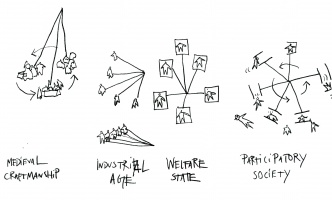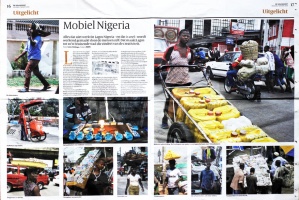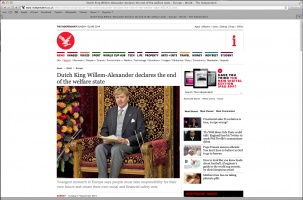User:Luisa Moura/thematic/trimester III/Work V2: Difference between revisions
Luisa Moura (talk | contribs) No edit summary |
Luisa Moura (talk | contribs) No edit summary |
||
| Line 2: | Line 2: | ||
[[File:LMoura_willem_alexander.jpg|x200px]] [[File:LMoura_schemes.jpg|x200px]] | [[File:LMoura_willem_alexander.jpg|x200px]] [[File:LMoura_schemes.jpg|x200px]] | ||
<div style='font-family:Courier,Sans;font-size:12px;color:#0431B4'> | |||
News from Nowhere, in CHAPTER XVII: HOW THE CHANGE CAME | |||
"Therefore, though they knew that the only reasonable aim for those who would better the world was a condition of equality; in their impatience and despair they managed to convince themselves that if they could by hook or by crook get the machinery of production and the management of property so altered that the ‘lower classes’ (so the horrible word ran) might have their slavery somewhat ameliorated, they would be ready to fit into this machinery, and would use it for bettering their condition still more and still more, until at last the result would be a practical equality (they were very fond of using the word ‘practical’), because ‘the rich’ would be forced to pay so much for keeping ‘the poor’ in a tolerable condition that the condition of riches would become no longer valuable and would gradually die out. Do you follow me?” (...) | |||
“Well, since you follow me, you will see that as a theory this was not altogether unreasonable; but ‘practically,’ it turned out a failure.” | |||
<div style='font-family:Courier,Sans;font-size:12px;'> | <div style='font-family:Courier,Sans;font-size:12px;'> | ||
| Line 29: | Line 37: | ||
William Morris describes the reason why a model of equality like a welfare system ultimately ended in failure, it relied on an asymmetrical awareness of reality and knowledge about the financial machinery, leading to an increase on a slavery-like situation among the most vulnerable layers of society. The ultimate tool to reach the utopian world of News from Nowhere was the revolution by force, and while explaining this he mentions a delicate detail within the story that shows the powerful role of media. An editor in particular decided to depict the truth about the emerging revolution in his newspaper against institutional will and managed therefore to generate public consciousness. | William Morris describes the reason why a model of equality like a welfare system ultimately ended in failure, it relied on an asymmetrical awareness of reality and knowledge about the financial machinery, leading to an increase on a slavery-like situation among the most vulnerable layers of society. The ultimate tool to reach the utopian world of News from Nowhere was the revolution by force, and while explaining this he mentions a delicate detail within the story that shows the powerful role of media. An editor in particular decided to depict the truth about the emerging revolution in his newspaper against institutional will and managed therefore to generate public consciousness. | ||
“(…) The other exception was a paper thought to be one of the most violent opponents of democracy, and so it was; But the editor of it found his manhood, and spoke for himself and not for his paper. In a few simple, indignant words he asked people to consider what a society was worth which had to be defended by the massacre of unarmed citizens, and called on the Government to withdraw their state of siege and put the general and his officers who fired on the people on their trial for murder (…) Of course, this editor was immediately arrested by the military power; but his bold words were already in the hands of the public, and produced a great effect: so great an effect that the Government, after some vacillation, withdrew the state of siege (…)” the redemption of Media... | “(…) The other exception was a paper thought to be one of the most violent opponents of democracy, and so it was; But the editor of it found his manhood, and spoke for himself and not for his paper. In a few simple, indignant words he asked people to consider what a society was worth which had to be defended by the massacre of unarmed citizens, and called on the Government to withdraw their state of siege and put the general and his officers who fired on the people on their trial for murder (…) Of course, this editor was immediately arrested by the military power; but his bold words were already in the hands of the public, and produced a great effect: so great an effect that the Government, after some vacillation, withdrew the state of siege (…)” the redemption of Media... | ||
Revision as of 16:34, 16 June 2014
News from Nowhere, in CHAPTER XVII: HOW THE CHANGE CAME
"Therefore, though they knew that the only reasonable aim for those who would better the world was a condition of equality; in their impatience and despair they managed to convince themselves that if they could by hook or by crook get the machinery of production and the management of property so altered that the ‘lower classes’ (so the horrible word ran) might have their slavery somewhat ameliorated, they would be ready to fit into this machinery, and would use it for bettering their condition still more and still more, until at last the result would be a practical equality (they were very fond of using the word ‘practical’), because ‘the rich’ would be forced to pay so much for keeping ‘the poor’ in a tolerable condition that the condition of riches would become no longer valuable and would gradually die out. Do you follow me?” (...)
“Well, since you follow me, you will see that as a theory this was not altogether unreasonable; but ‘practically,’ it turned out a failure.”
CRAFTS AND THE IDEOLOGY OF SELF-EMPOWERMENT
This piece approaches the theme of Arts & Crafts from the relation that it might have with cycles of financial and political crisis. The ideology of Craft, as touching human skill, is only one of many ingredients useful to shift the attention of the individual from the public realm into himself, generating detachment from political criticism and notion of collective. We are being depoliticized by an overwhelming attention to what we are told to be our great inner power.
Craft is deeply related with the notion of manual pleasure and authenticity, rooted in personal skill and creative capacity. It is therefore ideologically associated with the fight for individual identity and freedom. Paradoxically though, craftsmanship has historically and in its essence a collective nature. Craftsmanship serves the gathering of different expertise at the service of a group, based on need, functionality and excellency of standards; which meaning does it have to speak about Crafts nowadays without this socioeconomic purpose? What is the meaning of Crafts in a global market and Individual-based logic?
If we do want to think about Crafts in a way that is broader than a mere humanist commodity, we should be aware of its economical and political meaning. There was never such thing as the individual craftsman that inspires our dreams of inner-me-power. Craft as one’s own production has no meaning detached from a collective effort and purpose.
In other hand, the belief in one’s own power is saving people from madness and fear, especially in countries were things went suddenly severally wrong. It is hard to read evil in articles or documentaries on this sort of human power, once it brings indefinite hope, but we must be aware that there is a conflict between this romanticism of the self and what law actually allows people to do. One of the videos in display shows a set of short interviews about Urban Crops in Lisbon. It is touching that this is happening, but is not being properly supported in order to empower people; most of this occupation is made on clandestine basis and property allowance is very unlikely to change in order to render such needs possible and accessible to everyone. Most of these men are probably going to be expelled from this land from one day to the other, but the message went through and people believe that they can find alternative ways of living in this midst of political and financial corruption. People would rather focus on this sort of message than on the need for a bloody revolution.
Small businesses and initiatives based on self-production seem to have mostly this ideological purpose, once hardly anyone manages to create something financially meaningful out of it. Market regulations increase by the day, as well as social and taxes policies. If in one hand we are fed this ideology of power, in other all our means to actually work independently are taken away, swallowed by global interests.
In Portugal the local trade and production of food was pretty common until a few years ago when international security laws were introduced to render it impossible. In the vicinity of Porto schools would order their food from local farmers, which probably happened a bit everywhere around the country, but it became forbidden. These farmers didn’t comply with complex demands of hygiene, packaging and so on and the schools were compelled by governmental decision to order everything from an industrial food provider. The links with the neighbourhood got broken, the children got plasticised food and the farmers lost their small source of income.
Traces of a supra-democratic dream though are to be found everywhere around us, in community construction of playgrounds, group claims for green areas, neighbourhood discussions on urban transformation, opinion platforms, evaluation meetings held by students in educational institutions. The bottom up principle, community interests, do-it-yourself mentality and integrity of action are here to substitute the decaying welfare state. People are stimulated to embrace entrepreneurship, flexibility of work, schedule and income; to look after each other and prepare their own future.
Everyone should try to do what is best at whilst adapting to market needs and finding his own personal way within it, exactly like William Morris dreamed of. And if people don’t really want this they are told they do and eventually they will believe it. On a throne speech from 17th September 2013, the King of the Netherlands said literally that in this time people “want to make their own choices” and “want to look after each other”. Really?
The welfare system was a great achievement of democracy, why do we believe that it is not suitable anymore? Why is there no money to pay for it? Is it indeed because there are too many people exploiting it as we are permanently told by the media? Wasn’t this money actually swallowed by the financial gambling? Aren’t we looking at the wrong side of things? Once again we tend to point the finger at each other instead of thinking from a collective point of view. We are told about all the parasites of the system, usually the most vulnerable layers of society, and we believe that they are the one’s getting away with our money.
Reality shows and documentaries on the decay of the welfare system like the 'Tokkies' in the Netherlands or 'Benefits Street' in UK, spread the necessary seed of conflict among the masses. Depicting negatively the user of a social system introduces the necessary ground for political disruption, breaking links of empathy among individuals and opening room for the subtraction of social rights. In the day the ‘Benefits Street’ documentaries were launched George Osborne (Chancellor of the Exchequer, UK) laid out his plans to cut another £10bn from Britain's welfare budget.
William Morris describes the reason why a model of equality like a welfare system ultimately ended in failure, it relied on an asymmetrical awareness of reality and knowledge about the financial machinery, leading to an increase on a slavery-like situation among the most vulnerable layers of society. The ultimate tool to reach the utopian world of News from Nowhere was the revolution by force, and while explaining this he mentions a delicate detail within the story that shows the powerful role of media. An editor in particular decided to depict the truth about the emerging revolution in his newspaper against institutional will and managed therefore to generate public consciousness. “(…) The other exception was a paper thought to be one of the most violent opponents of democracy, and so it was; But the editor of it found his manhood, and spoke for himself and not for his paper. In a few simple, indignant words he asked people to consider what a society was worth which had to be defended by the massacre of unarmed citizens, and called on the Government to withdraw their state of siege and put the general and his officers who fired on the people on their trial for murder (…) Of course, this editor was immediately arrested by the military power; but his bold words were already in the hands of the public, and produced a great effect: so great an effect that the Government, after some vacillation, withdrew the state of siege (…)” the redemption of Media...




